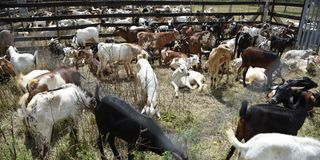Governor vows to revive Kimalel goat auction and cultural fair

Some goats at the Kimalel Goat Auction in Baringo County on December 21, 2019.
The renowned annual Kimalel goat auction and cultural fair in Baringo County will be revived by the new county government, Governor Benjamin Cheboi has said.
The brainchild of President Daniel Moi, the fair started in 1986 but it has not been held since 2019. It was suspended due to the Covid-19 pandemic.
The devolved unit is now rolling up its sleeves to revamp the once thriving event, with a focus on value addition of meat products. The move is expected to benefit local livestock farmers and uplift their living standards. Most of them depend on livestock keeping for a living.
Maoi slaughterhouse
The auction is expected to be modernised with the building of the Sh141 million Maoi slaughterhouse in Mogotio sub-county that is expected to start operating in September.
The multimillion-shilling project, funded by the European Union, is expected to benefit over 400,000 livestock farmers and traders, accounting for over 60 percent of the county population.
Governor Cheboi said on Monday that his main focus is to bring back the auction with a value addition component so as to improve returns for farmers.
“I revived the goat auction in my tenure in 2014 and my main aim was value addition. The annual event was, however, crippled by the Covid-19 pandemic. But we want to assure farmers that it will be up and running this year,” said Mr Cheboi, who was Baringo’s pioneer governor.
By the time it was stopped, the project had earned over Sh50 million from the sale of about 31,863 goats, 2,518 sheep and 180 cows.
Barng’etuny organised auction
The late former nominated MP Ezekiel Barng’etuny organised the auction, which would see over 8,000 goats sold in just one day, many of them through bidding.
In 2014, at the advent of devolution, the county government revived the auction and introduced the cultural component to make it a fun-filled event, which saw millions of shillings raised to support farmers.
In 2019, for instance, more than 1,700 goats were sold in a record 15 minutes into the event that was presided over by former Turkana Governor Josphat Nanok, who represented Deputy President William Ruto, fetching more than Sh17 million.
Sales
Baringo collected more than Sh1.2 million in revenue from the sale of goats, which retailed at Sh10, 000 each.
“Our major focus now is value addition and we are looking at working with investors and partners to market our products digitally and sell them to the outside world,” Mr Cheboi added.
To revamp the agricultural sector, the devolved unit also plans to utilise farmers training centres in the region to offer certified courses on modern farming techniques and management practices to improve their animal breeds.
The county livestock sector is expected to gain from the EU grant, which will attract investment in cottage industries in meat byproducts.
Commercialisation
The Maoi abattoir aims to enhance commercialisation and improvement of beef production and generate income for local residents.
Livestock Chief Officer Winnie Bore said once complete, the slaughterhouse, which targets the local and export markets, is expected to handle more than 1,000 sheep and goats and 200 cattle and will adopt a sustainable market-oriented strategy.
She said it will have a turnaround effect on the economy as it will create a ready market for livestock products and provide employment for more than 30,000 people.
“If fully exploited and modernised, it will have a multiplier effect on job creation, generate income at the household level, and improve food and nutritional security,” Dr Bore said.
Spur industrial growth
“Upon completion, the project will also spur industrial growth through spin-off industries and revenue generation, and mitigate against the perennial insecurity challenge as a result of livestock theft.”
She added: “The project will [put] the county at the forefront to compete with other regional and international markets which will see our meat being branded and certified for quality and safety for sale.”
Best livestock rearing practices
Livestock farmers and farmers’ groups in the region have been trained on the best livestock breeding systems and improved production practices, such as breed improvement systems, feedlot farming, pasture and fodder production and conservation.
Baringo has also established livestock sale yards in strategic areas in the county and is working with the state department of Livestock to establish a holding ground at Chemogoch in Mogotio sub-county.





